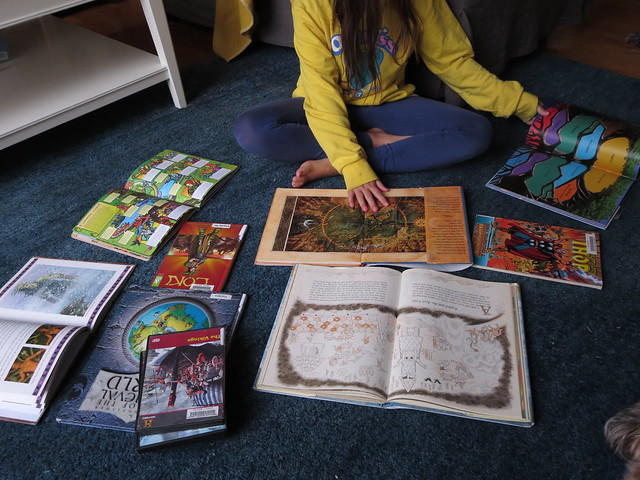
I hit a wall a few months back, and was incredibly discouraged about my ability to work and homeschool my kids at the same time - it was all too much and no matter how hard I worked at it, I fell further and further behind schedule and felt like I was drowning.
Some reflection led me to realize something that should have been obvious: I had gone on sabbatical from work this year and allowed the way we do school here to mushroom until it filled all that additional time and energy I had while not working. Slow goal-creep had occurred until we were (rather ridiculously) trying to do two foreign languages per child (and they had selected different languages!), American History AND Ancient World History (once again different programs for each child), and on and on .... Basically each time I encountered something I thought we should be learning, I just added it right on top as if we could do it all at once.
No wonder I couldn't keep up with my own expectations.
We simplified. A lot. I kept the core skills stuff in place: math, grammar, spelling, handwriting, reading, writing, typing. Music lessons continue. My daughter dropped her "extra" foreign language, while my son decided to continue trying to do Spanish with his sister and German on his own. And then we just let go of all the literature, science, and history we had been studying.
It's not that I don't think science and history are important. I just couldn't maintain that we had to follow these timelines and programs, on top of everything else. Instead we have turned to Unit Studies again. And I'm turning the managing of the unit study over to the kids themselves.
Our interpretation of the unit study method:
- Ask the kid what they want to study. Have them pick a topic for the next unit study.
- Acquire a rich variety of resources and supplies for them to use as they study this topic.
- Give them three weeks to study the topic, with a daily place holder of "Unit Study Time" on their assignments.
- On the last week of the month, there are no other assignments except for the essentials(practicing musical instruments for us), and all the time is spent on wrapping up the unit study and preparing for Presentations.
- Presentations must always consist of a written report And something else of their choice (a poster, a movie, a hands-on demonstration, etc).
- Get a real audience for the Presentation, even if it is only the Other Parent (the one that is less involved in the daily homeschooling) or a Grandparent.
So far, this has been a Huge Improvement for us. I have handed the responsibility for this part of their learning over to the children, to a fairly great extent. They are studying things they want to study, so their motivation is their own and I don't have to supply it through my management. It's more fun, and no doubt they will remember these topics and projects more because they had intrinsic motivation and applied meaning - all that good stuff we want to foster with our pedagogy.
No doubt my children will have strange and unique educations as they wend their way through the paths of knowledge guided by pure whimsy and wonder. But that will be just fine, I think.
(What have we studied so far? Norse Mythology, "other alphabets" - which then settled into "Runes", Cooking, and Steampunk. In January they have selected Marine Biology and Medieval Architecture.)

"No wonder I couldn't keep up with my own expectations." The story of my life, right there! (And the reason I am setting an intention in 2015 to do what I can with the amount of time I have.) You are absolutely right that a "strange and unique education" is just fine. I'm looking forward to reading about your unit studies!
ReplyDelete